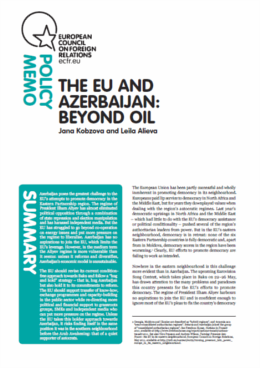The EU and Azerbaijan: Beyond Oil
How Europe can promote democracy in Azerbaijan
Hosting this week’s Eurovision Song Contest has put Azerbaijan’s authoritarian government and its human rights record under international spotlight. But attention should also focus on Europe’s relations with Azerbaijan, which remain guided by narrow energy interests.
Although Azerbaijan holds more political prisoners than any other Eastern European country, the EU has remained timid about human rights violations. The EU’s failure to pressure the Azerbaijani government to liberalise has brought few benefits and continues to discredit the EU in the eyes of Azerbaijan’s society.
In a new ECFR policy memo Jana Kobzova and Leila Alieva argue that Europe must now change its approach as the Baku government is more vulnerable than it appears:
- Azerbaijan’s oil and gas reserves transformed the country and led to a decade of impressive economic growth. However, with oil running out, Azerbaijan’s economic model is unsustainable. The government has made little effort to diversify the economy away from dependence on hydrocarbons.
- Since 2003 Ilham Aliyev has consolidated power in the presidency and steered Azerbaijan towards a full-fledged autocracy. The overall human rights situation is worsening.
- The government’s heavy-handed tactics may eventually backfire. By clamping down on independent media and repressing the secular opposition, the regime has closed most of the usual channels for expressing dissent.
Jana Kobzova and Leila Alieva argue that this weakness means that Europe must change its approach, to avoid a repetition of the Arab Awakening when it was left looking like a supporter of autocrats. Instead, the EU’s approach towards Azerbaijan needs to be more vocal and bolder:
- The EU needs to redirect more political and financial support to grassroots groups, SMEs and independent media who can put more pressure on the regime. The EU should be more vocal in demanding greater political pluralism.
- The EU should continue to use its dialogue with the government to assist in areas that are important for Azerbaijan’s modernisation and transformation, such as governance, rule of law or diversification of the country’s economy.
- The EU is Azerbaijan’s most important trading partner and should use this as a leverage to push for change.
- EU member states should follow the UK’s example and introduce new rules banning those non-EU nationals accused of human rights abuses from entering the EU – this would change the calculations for those in Azerbaijan’s elite taking part in human rights violations.
“As Azerbaijan grows more authoritarian, Europe faces a choice. It can fully embrace this country and its society, which is proud of becoming the first-ever Muslim liberal democratic republic in 1918, or it can continue its condition-free dialogue with the regime.” – Leila Alieva
“Unless the EU takes a bolder approach towards Azerbaijan, it risks finding itself in the same position it was in the southern neighbourhood before the Arab Awakening: that of a quiet supporter of autocrats”– Jana Kobzova
Contact details
The authors of the memo are available for comment and analysis on the situation in Azerbaijan.
- Jana Kobzova, ECFR Policy Fellow, [email protected], +44 7786 008 683 @j_kobzova
- Leila Alieva, Center for National and International Studies Baku, [email protected]
Key facts
- There are more political prisoners in Azerbaijan than in Belarus, the political opposition has almost been eliminated, the main TV channels are controlled by the government and journalists are regularly threatened.
- The volume of oil extracted in Azerbaijan peaked in 2010 and is set to continue to decline. Azerbaijan’s budget increasingly relies on transfers from the state oil fund (SOFAZ) rather than taxes.
- Between 2003 and 2010 the poverty rate dropped from 45% to 9%. But in 2011 the country recorded the lowest economic growth among all former Soviet republics.
- Azerbaijan is as corrupt as Russia or Uganda and ranks worse than neighbouring Georgia and Armenia. (Transparency International)
- The EU’s financial levers are limited: in 2012, the EU’s offer of €31 million in exchange for social and economic reforms was dwarfed by the almost €43 million that Azerbaijan earns every day from oil.
- EU democracy promotion in the Eastern Neighbourhood has failed: none of the six Eastern Partnership countries is fully democratic and democracy scores in the region have been worsening.
Notes for editors
- This paper, like all ECFR publications, represents the views of its author, not the collective position of ECFR or its Council Members.
- The European Council on Foreign Relations (ECFR) is the first pan-European think-tank. Launched in October 2007, its objective is to conduct research and promote informed debate across Europe on the development of coherent and effective European values based foreign policy.
The European Council on Foreign Relations does not take collective positions. ECFR publications only represent the views of their individual authors.



